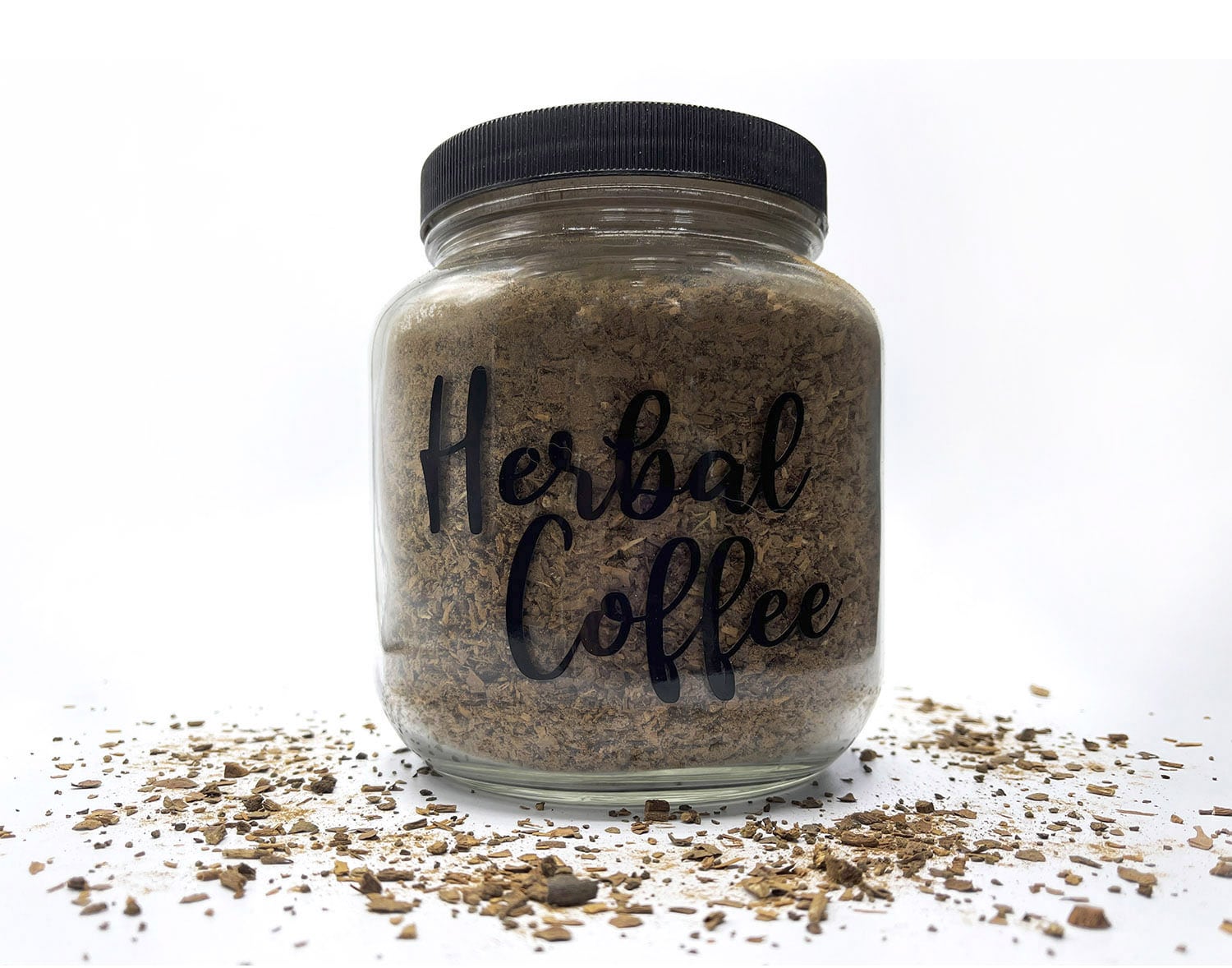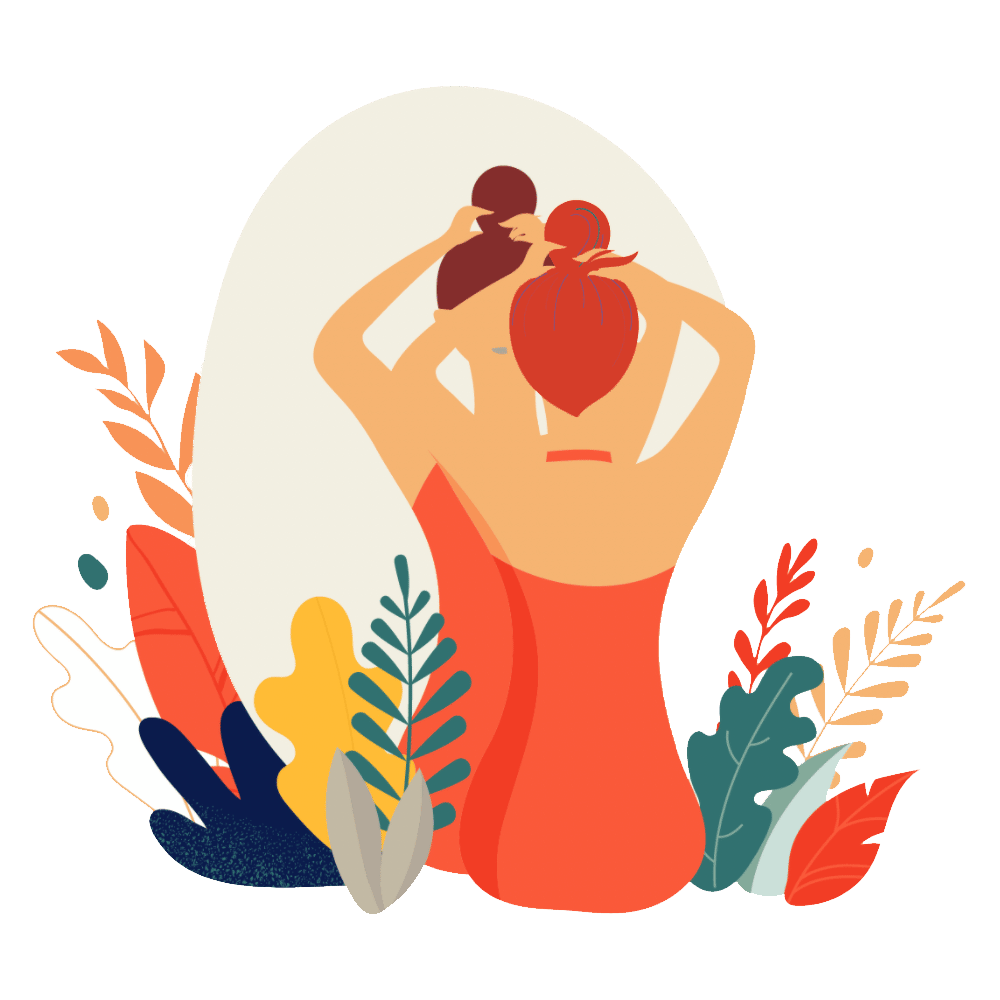Coffee can be a bit of a controversial topic.
Some sources say it’s addictive and one of the worst things you can do to your health, while other’s claim that regular consumption can thwart heart disease, diabetes and a myriad of other health problems.
As with most things, I think the truth likely falls somewhere in the middle, and a reasonable amount of coffee not bogged down with sugars and processed creamers is probably fine for most folks.
Morning coffee time is kinda sacred in our house, and I probably like my cuppa joe a bit more than some people. So to keep our caffeine intake at sane levels, we usually make “half-caff” coffee.
Caffeine isn’t necessarily bad, but it can become too much of a good thing pretty fast if you’re using it as a daily crutch to compensate for poor sleep hygiene, stress management, nutrition or exercise habits. If you’re dealing with adrenal fatigue, caffeine can over-stimulate already taxed adrenals and contribute to further burn out. Same story for those who suffer from panic attacks or anxiety.
Other clues that you might be drinking too much coffee include dry skin, disrupted sleep patterns and upset stomach. If you can’t skip a day of coffee without debilitating headaches, that’s also a sign that you probably need to reduce your dependency.
Decaf coffee might sound like the obvious way to go, but it actually still contains a fair amount of caffeine. The real trouble with most decaf coffee, though, is the way it’s processed — typically with chemical solvents (such as methylene chloride and ethyl acetate) or carbon dioxide. You can avoid the chemical caffeine removal process by looking for an organic Swiss water processed decaf.
Or you try…
Herbal coffee
In recent years, the market has been flooded with new brands of herbal coffee substitutes ranging from roasted herbal roots to powdered mushrooms and everything in between.
Despite its recent surge in popularity, herbal coffee is actually not a new concept. People raised in the south might remember folks mixing roasted chicory root into their coffee – both for flavor and as a frugal way to extend relatively expensive coffee beans.
Cafe Du Monde’s Coffee and Chicory blend is an old staple that’s been around for ages. Mr. Redheaded Herbalist, whose mother’s family is from Louisiana, recently brought home a can for nostalgia’s sake, but we can’t get past the over-roasted flavor. I’m sure it’s an acquired taste, but it tastes burnt to me.
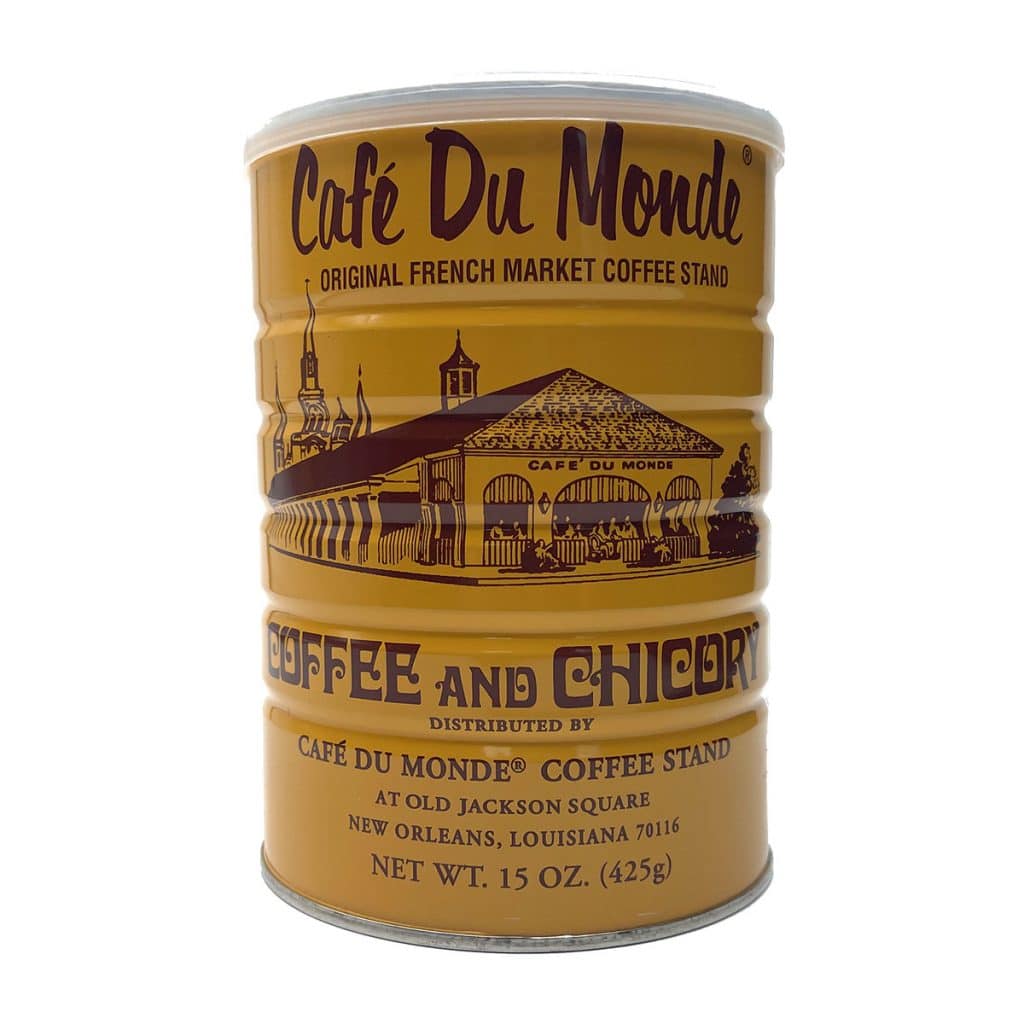
A few commercial herbal/mushroom coffee brands that I have tried and liked include Dandyblend, Sun Alchemy’s mushroom coffee, Four Sigmatic, and Swanson’s organic ganoderma (reishi) coffee.
Still, I prefer to make my own herbal coffee blends. It’s cheaper, I can make it in bulk, adjust the ratios to suit our tastes and, most importantly, I know EXACTLY what’s in it. Plus, it’s stupid-simple to throw together. Winning! ♥
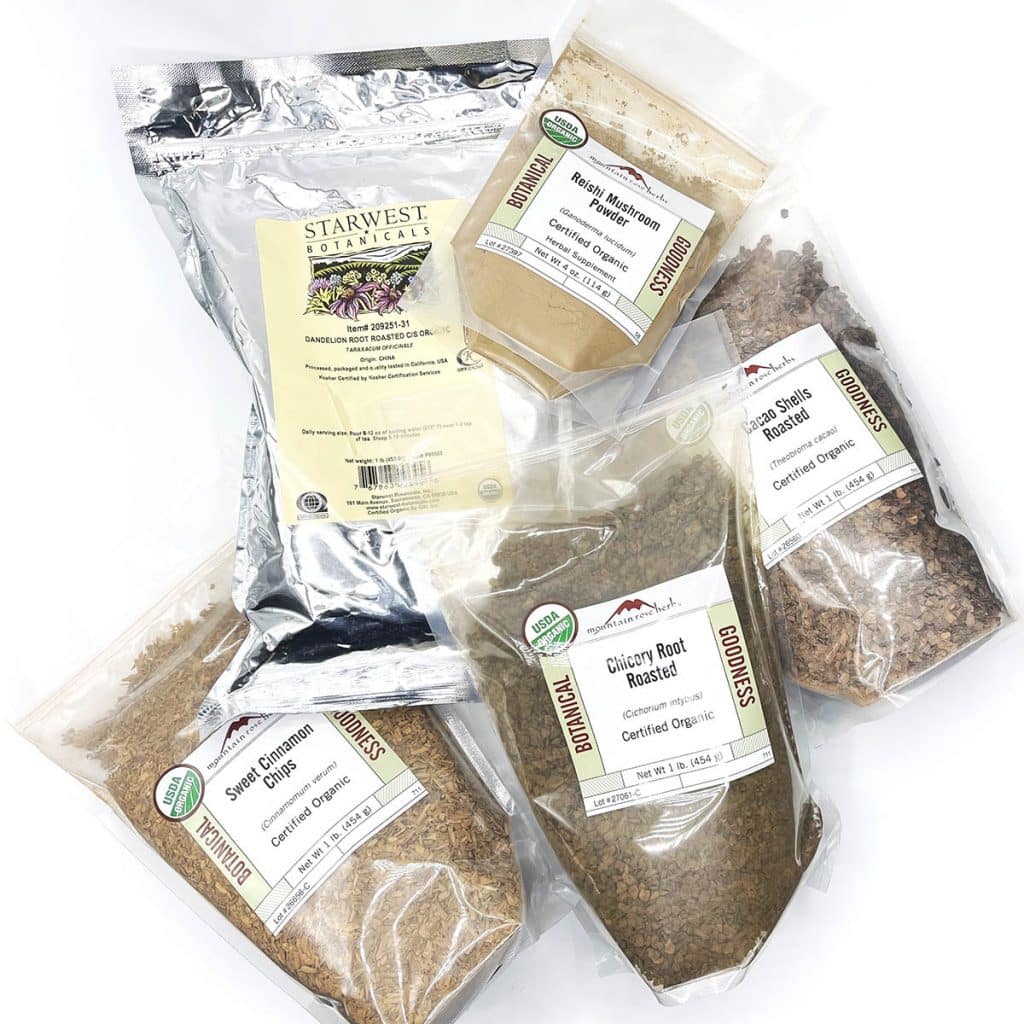
Why reishi?
Ganoderma lucidum is a wonderfully useful mushroom that is included in many herbal coffee blends for its adaptogenic and nutraceutical actions. According to James Green in The Herbal Medicine Maker’s Handbook, reishi is a primary supporter of the immune system and is believed to enhance white blood cell production and stimulate macrophage activity. Macrophages are a type of white blood cell that functions as our bodies’ cellular housekeepers, removing cellular debris and foreign substances such as cancer cells and pathogens.
Among the edible mushrooms, reishi has one of the highest levels of beta-glucans, a type of soluble fiber that feeds beneficial gut bacteria and improves the overall composition of the microbiome, which supports healthy bowels and may be protective against Alzheimer’s disease and cognitive decline.
Regular consumption of reishi may promote healthy blood lipid and sugar levels, protect against oxidative damage and reduce inflammation. Its anti-tumor actions are also being studied as a potential therapy for treating cancer in addition to a variety of other advanced diseases.
Balancing diuretics
Generally speaking, it’s a good practice to aim to drink an equal amount of water for every cup of coffee you consume – even if it’s herbal.
Caffeine is a weak diuretic and increases the amount of urine your body produces and can potentially lead to dehydration if overused. While herbal coffees have markedly lower caffeine content, they may introduce herbs that also have diuretic effects.
Dandelion root and chicory, for example, are both mild diuretics. Dandelion leaf is where the strongest diuretic action resides, but the root also has some diuretic effect.
Related: Take your Herbal Coffee to Go
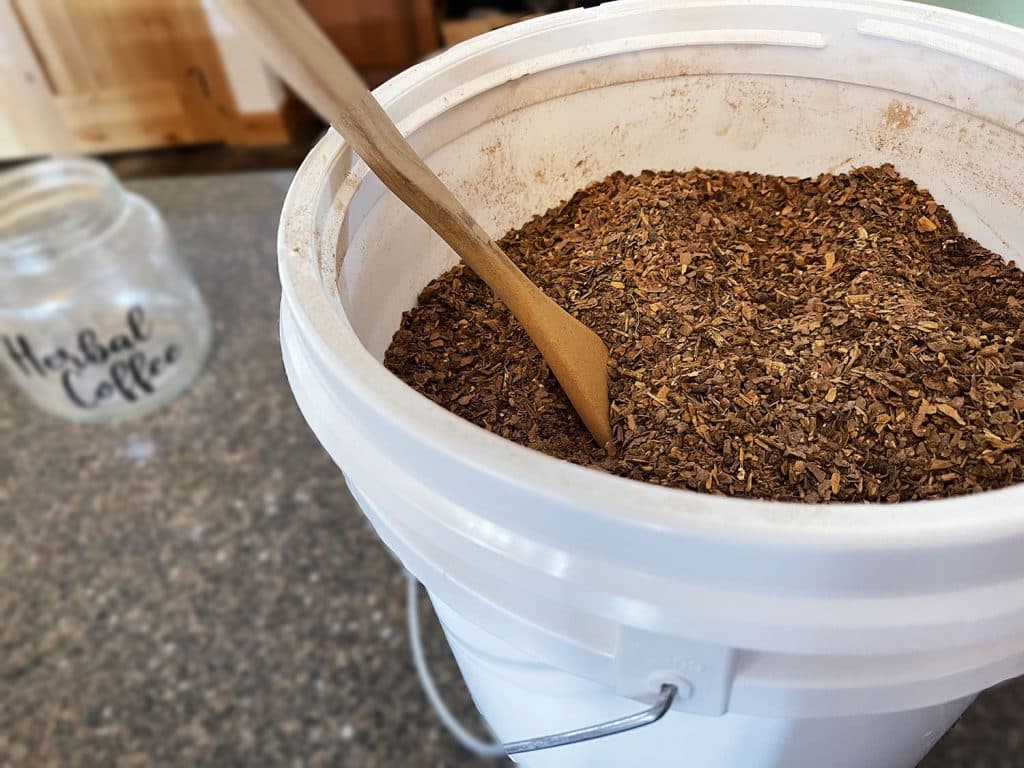
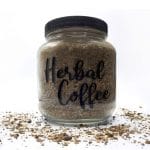
Herbal Coffee with Reishi
5 Stars 4 Stars 3 Stars 2 Stars 1 Star
No reviews
Ingredients
2 parts roasted chicory root
1 part roasted dandelion root
1 part cinnamon chips
1 part roasted cacao nibs (optional: will add some caffeine)
1/4 part reishi mushroom powder
Instructions
- Measure out your ingredients; the ingredient list is given in parts so it can be scaled easily
- Combine ingredients in container/bucket
- Stir
- Brew coffee however you normally would, using your herbal coffee blend as a 1:1 coffee replacement
- Sip sip hooray ♥
Notes
I recommend glass containers for storing homemade lotions and potions. Glass doesn’t leach chemicals and it’s easier to clean/sterilize after the product is used up and you’re ready to refill.

